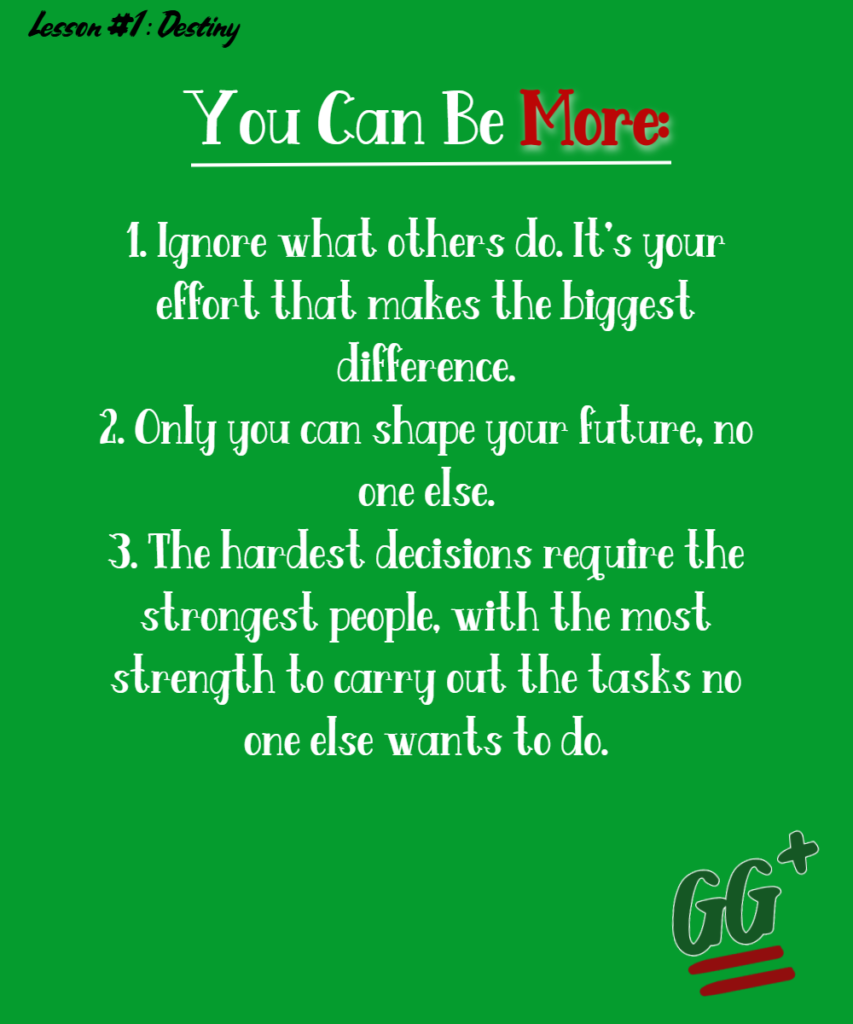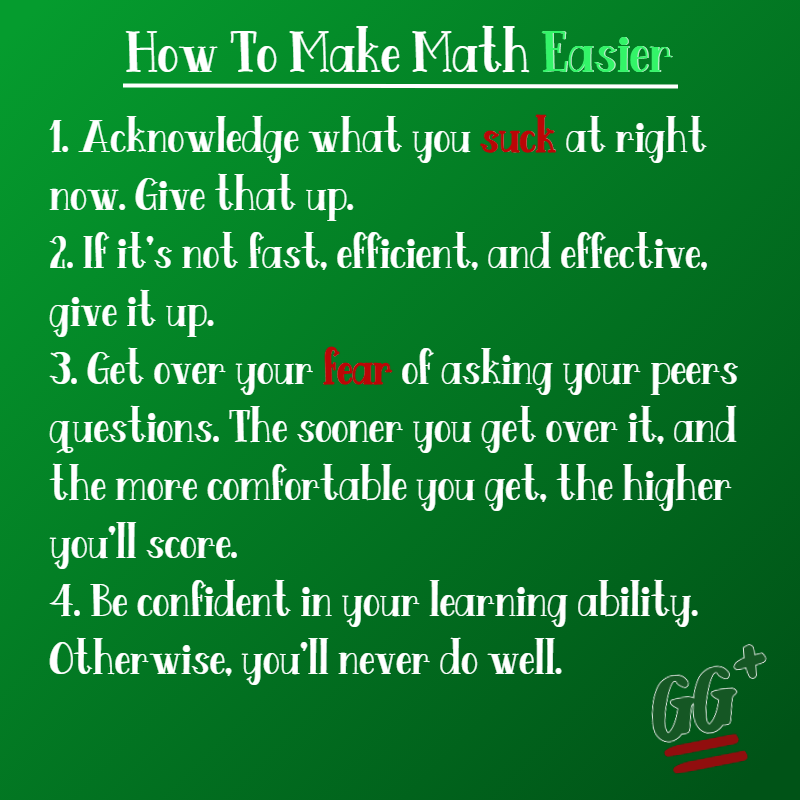6 min read

“How To Score Better On Math Tests While Doing Less.”
Introduction
Math is the one subject I used to fear, especially among every other subject. It seemed so scary and frightening, and almost seemed like I would inevitably do bad on every single one unless I spent hours of my precious time at home studying.
Studying is essential for getting good grades, but it’s a “skill” that once you leave high school, or leave college and complete your degree, will no longer matter. You could’ve spent years of your life perfecting the skill, and have even found “the way” to studying; but it doesn’t excuse the fact that it will no longer hold any meaning to you the moment you step out of those doors.
In this post, I want to teach you a method to studying that is more tactical and efficient; while also being smart and high-leverage. I want you to learn a method to studying that you can apply generally towards anything, and not a specific subject in school. That’s what studying should be. It should be a skill that can be applied to absolutely anything; and not a narrow range of things.
How You Might Study, And Why It Could Be Better
You might have your own method to studying that probably goes along the lines of this:
- Learn the subject
- Re-learn
- Practice (until there’s nothing left to learn)
If this method works for you, and is good enough to help you score high on a majority of your tests, then maybe you should stick with it.
The reason why I recommend a switch, despite how reliable the method might be for you, is because of the problem regarding efficiency. A good method is one that allows you to score well, and simultaneously save you hours of time; time that you could spend doing literally anything else in the world.
A majority of methods however, work really well. Active recall is one of those very methods. However, I feel that the only real problem with it is that people generalize it far too much. Active recall is also apart of active learning.
The point here is: popular methods that you see every influencer advertise online usually doesn’t work, and even if it does to some extent, it’s too slow (or simply could be faster).
Don’t Do What Everyone Else Does
Let’s get one thing straight. Not everyone studies, and not everyone cares enough to sit down, and actually learn something new. And you know what? It’s totally fine, to an extent. Don’t take what I said out of context.
A lot of students in that pool also cheat, and make it one of their central ways to passing assignments, quizzes, and tests; ultimately, in a collection of students, it’s inevitable.
It’s also the same ultimate, general reason why there will always be the “bad” and “good” side of society. Some people will follow the rules, avoid punishments, and do what they must do and as they are ordered; while others refuse to do things the “right” way and have their fate and reality be taken into their own hands – but with one big difference: risk. You risk losing everything; your loved ones, your aspirations, everything you’ve built over the last few years, even if you haven’t built a structure yet – there’s always a tsunami or earthquake that can destroy your crops and land that’s on it.
So, the fact that you’re willing to improve, and willing to care enough is great. Really, the only students who actually care enough to study are also the same ones who want to get into great colleges, and get a good degree, and make their parents proud.
What Jobs Today Require
I believe that that route works, but that by no means is it required to get anywhere. Lots of jobs today can be gotten (I can’t think of any other word) with just work. By that I mean: the usual perseverance, insight, and time. But, another element that people don’t tell you (because they probably don’t know) that also goes into this equation is uncertainty.
I’ll make a completely separate post on this, because I honestly think more people should know about it; and it will save you so much time and years of your life spent worrying and stressing.
You Can Be More
Instead of just going out there and cheating on every test, or saying “screw it”, and just lowballing every test, expecting to do well (or not) and then just turning your smile upside down once you receive your score. But, if you’re like the rest of us, then you start appreciating life more after that one test. Yes, that one test that either brought you so much trauma beforehand, or you thought would be so easy.
Man, that’s one thing about high school that I’ll never forget. You walk into a test, feeling so confident about a test, feeling that you’re ready to dominate; but once you actually get the test, everything comes falling down on you.
All of a sudden, your world went from hope and sunshine to darkness and despair. How did everything come to this? “You know, maybe this test doesn’t matter so much. Yeah! I’ll be completely fine.”
Every time, when you least expect it.
That’s why I’ll tell you now: you can be more.
Math tests are the ones that make a majority of people question their life, and what everything has led up to in the first place; and honestly, there’s no avoiding it.
You can master all the content, every type of question, memorize your teacher’s question style, but you’re no robot. You’re doing something that a robot does best at. No human can beat that.

Accept Your Inability of Not Knowing Enough
You are a learner, just like everyone else.
Every one of us learns from another person’s mistakes, or our own. It’s how you see the world that determines if you see this truth or you don’t see it at all.
The reason I’ve said all of this is because I believe that you, even if you feel that you just aren’t naturally smart, can still score higher on every math test, even if you think you can’t. I know it’s a problem I struggled with. When I was first in elementary school, and did that math (you know, subtraction, long addition, long division, graphing) that you remember so fondly, I loved math. Learning math wasn’t like any other kind of learning. It was fun.
When I used to get extremely lengthy worksheets with 40 or 60 questions, I would get it done in less than 5 or 3 minutes. I wasn’t particularly smart, or better than everyone else, I just loved learning.
And as you grow, you start to lose this passion and this love for practically everything. Although maturity does play its part in doing so, so does your environment, and the people that teach you from Monday to Friday. If they lack passion, and don’t teach with the same energy that your elementary teachers taught with (that’s at least how it was in my experience), you will not learn the same.
Don’t Get It Mixed
This isn’t a lesson about passion, nor about a love for learning, but about accepting something important: ignorance.
You might perceive ignorance as literally meaning how it sounds, ignoring the truth. But, you’d actually be referring to arrogance (I think). Ignorance is not knowing the truth; NOT ignoring it. But, by going everyday knowing that you need to change your methods, however necessary, and not doing so, that’s arrogance – not ignorance.
Why Any of This Matters
If you care enough to study, you will move forward. And if you care enough, and aren’t so ignorant, you will also know (or recognize) that whatever methods people tell you about, don’t work.
Practice takes forever, and who in their right mind likes to sit down and practice? Not me. Not anyone.
Sure, you do have to be disciplined to a heavy extent, recognizing that you have to do what you don’t like if it means getting better. But, you also have to recognize that just because it works for someone else doesn’t mean it will for you.
How I Did Better While Doing Less
The most common resource people use to understand material better is to watch videos or ask their teacher.
However, in my experience, this either didn’t work or required too much time for input. Watching YouTube videos requires me to sit down, practice, and hope that they cover the exact problem type that I’m looking for. And if my teacher doesn’t explain something in a way that makes sense to me, forget it, I’ll just figure it out on my own. That’s the worst part about math: someone that doesn’t understand that just because it makes sense to them, doesn’t mean that it will for someone else.
That goes for any kind of subject. You might explain something in a way that makes sense to you. But if you explain it that same way to someone else, it usually doesn’t work for all people. The only way to make it make sense, even if they suck so much at X, is to explain it to them like they’re 5 (unless they literally are 5; in which case, you’re talking about a completely different situation).
For the longest time, I did YouTube, and stopped asking teachers. I realized instead, recently, that there was actually a much better method. You see, when we learn, we tend to learn best when someone, or something explains it to us in a way that makes sense to us.
Now, I’m not saying all teachers don’t understand this – some do. However, a majority don’t, and even if they’re willing to answer questions, their “tailored” response still isn’t good.
My method was asking other people.
How Elon Musk Learned Rocket Science Without A Degree
This might seem off topic and not correlate with what we’re talking about, but trust me, it does; and it might even help you score the highest.
If you didn’t know by now, Elon Musk, founder of SpaceX (leading contender of NASA, which was federally operated), had the dream of learning about rockets, and making humans a multiplanetary species. Even to this day, we still work towards making this come true. And, you have to give them credit for setting such a daunting goal, and doing their very best to make it come true.
Elon Musk knew how difficult it was to get into the industry, because the only other space company at the time was NASA. And, they were federally operated, and weren’t managed by one person at the top of the pyramid. So, it was quite a reach.
And, one thing that he needed to do especially was learn rocket science in the first place. Sure, he could’ve hired a team to help him do everything; but that too requires lots of startup capital (money) that makes the start-out of the company far too expensive.
So what he did was seek out and get into contact with other professionals and well-known figures in the industry, and sit down with them and ask questions. He would ask about everything he needed to know about rockets. And, it eventually turned out to pay off in the long run. Ask him any question you wanted to about a specific part of a rocket, and he would answer it right on the spot.

What Elon Did Differently
When we approach education, we tend to approach it in a long-term way. We need to read, we need to listen, and we need to observe what other people do. But, what if I told you the best way was from someone that already knows exactly what to do, down to the last step?
This is exactly what Elon did differently. He could’ve went to college, gotten into debt, and spent hundreds of thousands of dollars on a formalized education to learn aerospace engineering and about everything he needed to know to become a professional, but he decided to take a different route. Rather than doing that, he would condense everything that there was into the parts that he only needed to know with the help of industry experts that have already spent their entire lives studying and working in the field themselves.
You can technically do the same thing. Instead of depending on yourself to figure everything out, why not put that pressure on other people. Why not give them that same task? Ask someone else, who already knows what to do, and let them explain it to you in whatever manner makes the most sense to you.
My Real-Life Example
This is exactly what I did in my Junior year of high school and it’s what allowed me to speed-learn practically anything. We formed our own little group (consisted of like half the class), where we would help each other with homework and classwork, and I could ask several people about a concept. I asked one person, and asked them, politely of course, to explain it.
If they didn’t get it, I asked someone else. In the end, I understood every concept that was taught; even if I still ended up getting a question wrong on the test on that same concept because of some weird problem structure or whatever other bs. Something always goes wrong, even if I do feel confident.
The Best Approach To Math
The best approach to studying and mastering math is to let other people answer your questions. You can let other people answer your questions, or work on them together. That way, you build connections and learn at the same time. These will matter as the year goes by.
I don’t expect you to form any kind of group however, but if you could, then that would be great. It’s great for socializing, making friends, but most importantly, doing well on exams.
If you’re in high school, your best bet is just making friends and adding them to some kind of group chat (unless someone else does it) and using that to give feedback or share answers on homework. As long as everyone understands it, and are willing to help one another, then it really doesn’t matter.
And if you’re in college, then you might struggle doing the same thing. In that case, your best bet might also be to make friends and ask other people, but also find people who care enough anyways, and to find people who will look at their phone and at their messages. You need people who are active, not to the point where you never see them offline, but to the extent that if you message them, they are going to respond soon. If you can do this at this phase in your education, then you will save yourself, and everyone else’s ability to pass the class.
If You’re Not Social
And, for those who are too scared (or just don’t prefer – don’t worry, I get it) to ask anyone else for help, I recommend you to use AI. Chances are, you might already use it to verify your answers, so big surprise, you probably already knew this was coming.
The only thing I really suggest you do here is to make sure you’re using it accordingly.
Use it to explain concepts step-by-step, and explain stuff in a way that makes sense to you. ChatGPT is a classic one that works perfectly in this situation. Do that, and you’re set.

Conclusion
Math isn’t too bad, once you understand it of course. But when you don’t, a more appropriate name is legalized torture. If you want to do exceptionally well at any math subject, you need to separate yourself and learn away from the traditional methods implemented by other people. Do what works, but what simultaneously is fast.



